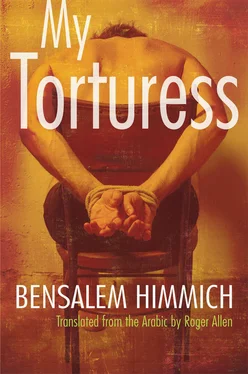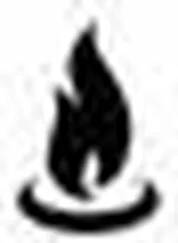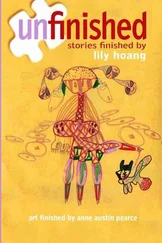In the hospital operating room, my carrier put me down on a high bed on wheels, then left. He handed my crutches to an orderly and gave me a very affectionate glance. The orderly removed all my clothes and tossed them into a basket. He then washed every part of my body, dried it off, and sprinkled it with eau de cologne. He took my temperature and felt my pulse. With a penlight, he examined my eyes and my mouth and felt the most sensitive parts of my body. While he was finishing his work and recording the results on a chart, a foreign-looking doctor came in wearing a mask. After checking the record and putting on a pair of gloves, he started taking a close look at my leg and giving it a close examination. It seemed as though he were deciding on its fate: either amputation or drugs and antibiotics. Eventually he whispered something to the orderly, which I did not hear, and then left without saying a single word to me.
The orderly gave me an ambiguous look, which I interpreted as meaning bad news. He gave me an injection, which I assumed was intended to make me unconscious. He now set about cleaning the swollen parts of my leg, then rubbing special ointments on it and cotton swabs soaked in liquids with a powerful smell of alcohol. Contrary to my expectations, I remained fully awake, and it occurred to me that, since my leg was receiving this kind of treatment with concentrated drug therapy, it implied that — Thank God! — there was no danger of amputation, even a partial one. When my savior proceeded to wrap my legs in copious bandages, that impression was confirmed. After he had dressed me in an orange-colored garment and transferred me to a bed in a small room nearby, I felt even more confident. He told me that I would be staying in the room for a while under medical supervision until my leg was cured. I thanked him profusely and asked him for his name and that of the members of the medical staff. I hoped thereby to be able to get him to tell me who was the foreign female doctor, Na‘ima’s friend, who had been so kind to me. However, he told me in the accent of someone from the Eastern part of the Arab world that I was here to be cured, not to ask questions. He then ordered some pills for me that I was supposed to take with some fruit before going to sleep. With that, he left.
Among the pills that I was supposed to take there was likely to be one that was a soporific. They obviously wanted my leg to get better using medicines, while my mental state stabilized with some sound sleep. I woke up in the middle of the night needing to piss; I had no idea what day of the week it was. I could not find my crutches anywhere, so I had to crawl with my leg in bandages and look for the toilet. It was so dark in my locked room that I could not find it. I could not decide whether to yell for the night-nurse or evacuate my bladder against a wall. Reluctantly, I decided on the latter, and then went back to my former position, where I lay on my back, sleeping part of the time, and waiting for dawn to break for the rest of it.
When night was replaced by daylight, a portly, menopausal nurse with olive complexion came in. She cursed whoever it was had spread such a foul stench in the room. Taking a bottle out of her apron, she proceeded to take a sniff from its contents. Standing on a chair, she opened a window that I had not noticed before. Disappearing for a moment, she came back with breakfast on a wheeled table and put it in front of me. She asked me if I were the one who had covered the wall with piss, and, without even waiting to hear my reply, she poured a liquid down my throat and give me an injection, instructing me all the while to eat. Before she left, I asked her about the toilet, and she pointed to a corner in the back with a plastic curtain.
Truth to tell, breakfast consisted of a variety of food, rich in proteins and vitamins. As I ate it all with gusto, I kept wondering to myself what might be the reason for such plenty — this display of truly Hatim-like generosity.* Were they trying to compensate me for all the evils things they had perpetrated against me; or was it some cunning plan either to get me well again or bring it to a crowning conclusion through assassination? With me in my current condition, the best thing was obviously to leave things as they were and let the fates do what they willed. I had to hold on; that was my plan and my surety till either victory or death.
I finished everything on the plates and still wanted more. I looked at my leg all wrapped in white bandages; it was as if I wanted to know how things were going. Everything seemed to be pointing to improvement and the possibility of a cure. I then took a look at the window above me. The sunlight and blue sky were so intense that the bars seemed to be illuminated. I stayed this way for a while, looking at my leg at times, but then staring upwards, where occasionally I would spot flocks of migrating birds. When yesterday’s orderly appeared, I greeted him warmly, and he reciprocated. He proceeded to clean my leg with fragrant liquids and medicinal ointments, then changed the bandages. Once he had finished, he told me to practice walking, but I told him that that would be difficult. I asked him to get me my crutches so I could avoid falling down and harming myself. He brought me one of them.
“Now walk!” he said.
I managed to take some steps around the room relying on just one crutch. The orderly was impressed and put me back in bed. He told me to take some pills after lunch. Before leaving, he gave me a time when I would be taken back to my cell that evening.
The lunch that the same portly woman brought me was just as delicious as the breakfast I had eaten earlier. She reminded me to take the pills, and I did so. I did my very best to have a pleasant conversation with her, but she gestured to me to the effect that the walls had ears. After giving me another injection, she left, taking with her the tray and what was left on it. I now felt very drowsy, anticipating that my eyes and senses would soon give way to slumber, but I was mistaken because a masked guard now came into the room.
“Time for a stroll first!” he insisted.
I pointed out to him that I was in recovery; my condition made me exempt.
He started cursing and threatening me.
“Just say a prayer to the Prophet!” he said.
I begged him to postpone things till later, but he banged my bandaged leg and told me to hurry. I got out of bed so as to avoid an even worse blow and followed him, hobbling along on my single crutch. We now passed through a variety of halls and blocks along with others of various categories. When we eventually went outside the building, he attached me to a group of prisoners. Guarded by a troop wearing medals and helmets, some of them apparently foreigners, we made our way in a terrifying procession. I asked the person closest to me what was going on.
“They’re taking us,” he told me falteringly, “to dig our own graves or those of our brothers. .”
I started shaking, and my remaining teeth chattered. My cough came back, and I did my best to suppress it. If the prisoner to whom I spoke had not lent me his spray, my condition would have drawn the attention of all the guards close to me.
When we arrived at a flat, dusty spot, they handed us axes and spades and divided us up into twos and threes. We were told to dig graves two feet deep and no more. With no other choice but to obey, I set my crutch aside as best I could and started digging up the soil to the extent that my injury allowed. A guard spotted me and threatened to throw me into one of the graves and pile the earth on top if I did not work seriously enough. I redoubled my efforts, and now and then other diggers who sympathized with my plight helped me.
When the officer in charge had counted the number of graves dug and blown his whistle to stop work, his aides told us to sit where we were. They allowed us to rest for a while and drink some water. Time went by, as heavy as lead, and our heads roasted in the boiling-hot sun. Some people had sunstroke, and a young prisoner, who they told me was actually a doctor, was allowed to help them as much as he could, which meant spraying their heads and bodies with cold water.
Читать дальше












